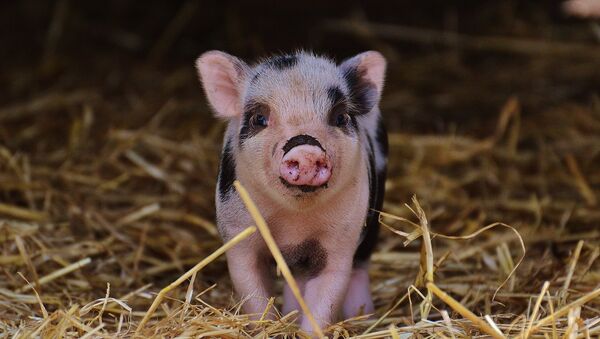A team led by Zhao Jianguo at the Institute of Zoology at the Chinese Academy of Sciences in Beijing has successfully edited the DNA of pigs to make them both leaner and more tolerant of cold.
Zhao's team used a gene-editing technique called CRISPR-Cas9, a new and more precise method of targeted genome editing first introduced in 2012 and hailed by New England Biolabs as heralding "a new era in molecular biology."
Scientists added a gene called UCP-1, which regulates both fat deposition and body heat and is common in most other mammals but missing in pigs. This allowed them to increase the pigs' bodies' natural ability to adapt to cold environments while simultaneously lowering the amount of fat their bodies accumulated.
The scientists added a version of the UCP-1 gene found in mice to 2,553 pig embryos — a careful and time-intensive task — and then planted them into 13 sows, three of which became pregnant. The 12 piglets they produced showed better body temperature regulation capabilities than regular pigs and had 24 percent less body fat.
The development could be a "valuable resource" for agricultural production in terms of improved pig welfare and reduced economic losses, the paper said, according to NPR. It could save pig farmers millions of dollars in heating and feeding costs, as well as save the lives of millions of piglets, who are much more vulnerable to the cold than fully grown adult swines.
"This is a big issue for the pig industry," Zhao notes. "It's pretty exciting."
R. Michael Roberts, a professor in the department of animal sciences at the University of Missouri, who edited the paper for the scientific journal, observed, "it demonstrates a way that you can improve the welfare of animals at the same as also improving the product from those animals — the meat."
While genetically-modified meat still raises some eyebrows, the US Food and Drug Administration has been selectively approving meat from gene-edited animals since November 2015, when it first approved meat from modified farm-raised salmon for human consumption, Vice Munchies reported at the time.
However, Roberts doubts that these particular pigs will be imported into the USA, much less "ever be allowed to enter the food chain."
Nonetheless, this discovery is an important victory in the fight against food insecurity, with the world population projected to near 10 billion by 2050, according to UN Department of Economic and Social Affairs estimates, and also an important stepping stone for further genome-editing techniques and the field of molecular biology.




